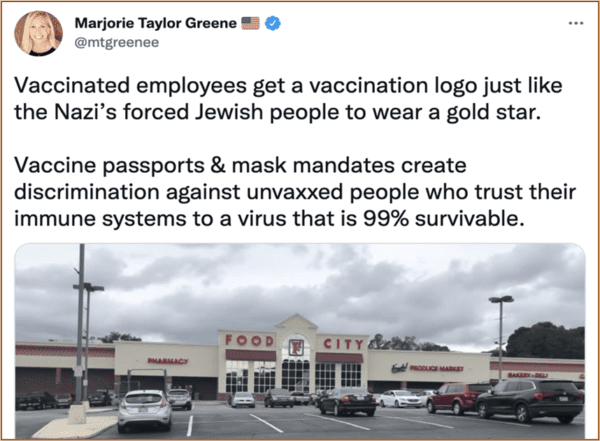
Being newsworthy is often considered to be in politicians’ best interest because, the more media attention one can get, the further they can spread their message to members of the electorate and potentially gain new supporters. But is all press necessarily good press? While it may seem intuitive that negative coverage is something one should try to avoid, in recent years (and especially after the Trump presidency) some of the most prominent figures in American politics are precisely those who capture media attention with inflammatory and sometimes even false statements. One such figure is Marjorie Taylor Greene, a Republican congresswoman from Georgia who, despite having only served in her position for approximately one year, has already made a name for herself due to her unapologetically provocative claims made on social media, in interviews, and on the Capitol floor.
For example, on May 25, 2021 Greene took to Twitter to compare COVID-19 mask and vaccine requirements to the Nazis forcing Jewish people to wear gold stars during the Holocaust (Greene, 2021). Unsurprisingly, this controversial statement received backlash from just about every popular media outlet on the market and tons of social media attention. Even the Auschwitz Museum in Poland felt compelled to respond to Greene’s tweet, saying: “The instrumentalization of the tragedy of Jews … marked with a yellow star … in a debate on different systems that aim at protecting public health is a sad symptom of moral and intellectual decline” (Frias, 2021). Regardless of the overwhelmingly negative responses, Greene nonetheless was able to garner more free press than any public relations executive could dream of. This evokes a number of questions regarding the ethics of covering inflammatory politicians.
One set of questions to consider is how much attention journalists should give to politicians like Greene who make these kinds of statements. Is she purposely making outlandish remarks to receive free press, or does she genuinely believe that the Holocaust and pandemic mandates are comparable scenarios? Unfortunately, because we can never know a person’s true intentions, we are sometimes forced to make decisions with the limited information we do have. On one hand is the concern that, by reporting on her contentious statements, journalists and media outlets are only giving her an even larger platform to spread what many consider to be extreme views. On the other hand, whether Greene is earnest in her remarks or being facetious, she is nonetheless an elected official and the public should know what our representatives are saying. By not covering her inflammatory remarks, Georgians who disagree with these extreme views would lose the chance to alter their support for her.
Another set of questions concerns the consequences of giving politicians like Greene free press through news stories on their controversial remarks. Might doing so set a precedent for others to make provocative statements just to receive media attention, an arms race of extreme offense that turn out to be beneficial in the new attention economy? Some signs point to this as a definite possibility. Moreover, putting the spotlight of the press on certain inflammatory remarks might also serve to drive wedges between politicians from the party in question. For example, another Republican congresswoman, Liz Cheney of Wyoming, responded to the controversy by stating that Greene’s tweet was “evil lunacy” (Cheney, 2021). Though Cheney was certainly not the only person offended by Greene’s remarks, she received major pushback from her party for not being a “team player,” was asked by the Wyoming GOP to step down as chairwoman, and even sparked several candidacies to unseat her due to her “defiant attitude” (Draper, 2021). Regardless of whether Greene was being genuine or not, her ability to gain massive amounts of free press through inflammatory statements is viewed favorably by many in her fellow party members.
Greene’s contentious remarks have garnered her power both within the media and, subsequently, within her party. As she becomes more influential within the GOP and sets an example that others may follow, media outlets will have to decide the best way to ethically report on inflammatory comments made by elected officials. Though we cannot be certain whether Greene is intentionally provoking controversy or just genuinely holds controversial views, it is clear that the significant amounts of free press given to her because of such statements has drawn the attention of many politicians. What lengths might others go to in order to get similar media attention and how can journalists best respond while still informing the voting public?
Discussion Questions:
- What ethical values are in tension in the coverage of Greene’s inflammatory statements?
- How should media outlets cover inflammatory statements made by political figures like Greene? Are there any specific guidelines you would suggest journalists follow in their reporting?
- How should politicians ethically pursue press coverage and attention in the crowded marketplace of political discourse?
- What standards should journalists employ in determining whether controversial or offensive political speech is worth covering?
Further Information:
Bash, Dana. (2021, May 25). “‘Repulsive:’ Bash Rebukes Greene’s Holocaust Comments.” CNN. Available at: https://www.cnn.com/videos/politics/2021/05/25/dana-bash-on-marjorie-taylor-greene-holocaust-mask-mandates-ebof-sot-vpx.cnn
Draper, Robert. (2021, April 22). “Liz Cheney vs. MAGA.” The New York Times. Available at: https://www.nytimes.com/2021/04/22/magazine/liz-cheney-vs-maga.html
Frias, Lauren. (2021, May 25). “The Auschwitz Museum Slammed Marjorie Taylor Greene after She Likened Vaccination Badges to Nazi-Mandated Yellow Stars.” Insider. Available at: https://www.businessinsider.com/auschwitz-museum-marjorie-taylor-greene-vaccination-logos-holocaust-gold-stars-2021-5
Linker, Damon. (2021, February 3). “Marjorie Taylor Greene is Getting Exactly What She Wants.” The Week. Available at: https://theweek.com/articles/964515/marjorie-taylor-greene-getting-exactly-what-wants
Nobles, Ryan. (2021, May 22). “Marjorie Taylor Greene Compares House Mask Mandates to the Holocaust.” CNN. Available at: https://www.cnn.com/2021/05/21/politics/marjorie-taylor-greene-mask-mandates-holocaust/index.html
Stelter, Brian. (2021, May 25). “News Anchors Say Marjorie Taylor Greene’s Offenses are ‘Part of Something Bigger.’” CNN Business. Available at: https://www.cnn.com/2021/05/25/media/marjorie-taylor-greene-reliable-sources/index.html
Authors:
Kerry O’Malley Gleim, Kat Williams, & Scott R. Stroud, Ph.D.
Media Ethics Initiative
Center for Media Engagement
University of Texas at Austin
May 12, 2022
Image: Screen capture from Twitter
This case was supported by funding from the John S. and James L. Knight Foundation. These cases can be used in unmodified PDF form in classroom or educational settings. For use in publications such as textbooks, books, and other published works, please contact the Center for Media Engagement.
Ethics Case Study © 2022 by Center for Media Engagement is licensed under CC BY-NC-SA 4.0




